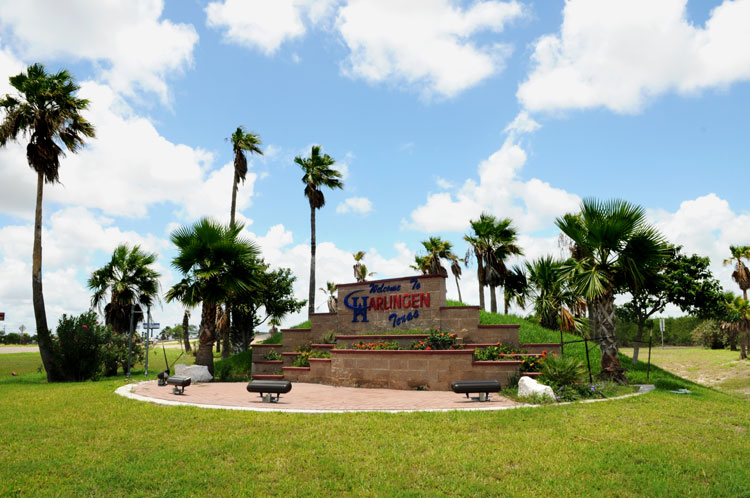HARLINGEN — The city’s property tax rate is being set — by a thin margin.
Earlier this week, Harlingen city commissioners voted 4-1 to pass the first reading of an ordinance calling for a $49.7 million general fund budget, with Commissioner Richard Uribe casting the dissenting vote.
Then, commissioners voted 3-2 to pass the first reading of an ordinance setting the proposed property tax rate at about 61 cents per $100 valuation — the same as the current tax rate — along with its proposed maintenance and operation rate of about 51 cents per $100 valuation and its proposed interest and sinking fund rate of about 10 cents per $100 valuation. This time, Commissioner Frank Puente joined Uribe in casting the dissenting votes during Wednesday night’s meeting.
On Thursday, Uribe and Puente did not respond to messages requesting comment on the reason they voted against the proposals set for their final votes on Sept. 22.
“In effect, they voted to default on our bonds,” Commissioner Michael Mezmar said Thursday, referring to the votes against the proposed interest and sinking rate, which sets aside money to pay off the city’s debts.
During the meeting’s public comment period, former City Commissioner Robert Leftwich called on commissioners to hold off on voting on the proposed budget, arguing they didn’t adjust the proposed budget to reflect changing legal expenses.
In the proposed budget, commissioners set aside $513,531 for legal expenses before they fired City Attorney Ricardo Navarro.
This year, Leftwich argued, the city’s proposed property tax rate would raise an additional $500,000 stemming from increases in appraised property values.
“A half-million-dollar reduction in the budget could affect whether you raise taxes or you don’t,” Leftwich told commissioners. “I don’t think the budget is ready to be approved.”
On Thursday, City Manager Dan Serna said the proposed tax rate is projected to raise an additional $335,000 during the upcoming fiscal year.
“We’ve got new construction that’s added to the tax rolls — commercial and residential,” he said.
For the upcoming fiscal year, the Cameron County Appraisal District’s property reappraisals boosted the city’s projected property tax collection from $21.4 million to $22.6 million.
After working on the proposed budget this summer, officials proposed a budget coming with $21 million in cash reserves, enough to run the city’s operations for 153 days in case of emergency.
Meanwhile, the proposed budget would also fund the reopening of the Tony Butler Golf Course’s nine-hole short course.
In June, the commission’s new majority voted to reopen the golf course’s nine-hole short course, a favorite among Winter Texans and young golfers, to try to draw players back to the golf course that’s run a deficit for about eight years.
To reopen the short course, Serna proposed $342,156 in start-up costs as officials plan to repair its irrigation system and upgrade its greens.
As part of the package, he recommended the $73,000 purchase of two mowers, $50,000 to buy 10 golf carts along with $219,000 in start-up costs, including $50,056 to fund the salaries of four part-time grounds keepers.
Commissioners are counting on the reopening of the nine-hole short course to draw more players to the golf course.
During this summer’s budget workshops, financial reports showed the golf course generated $666,986 while taking $983,470 in expenditures, leaving a shortfall of $316,484 during the current fiscal year.
According to the city’s report, the golf course has run annual deficits ranging from $419,713 in fiscal year 2015-2016 to $223,731 in 2018-2019.
After running shortfalls for about eight years, the golf course’s total deficit stands at $888,314, Wednesday’s report showed.
Since opening in 1929, Tony Butler stood as Cameron County’s sole 27-hole golf course — until last year.
In April 2020, the city’s past commission closed holes 19 to 27 to cut maintenance costs while mulling the sale of a 30-acre tract running across holes 19 to 23, prime land along Interstate 69’s frontage road with an estimated value of about $5 million.
However, holes 24 to 27 have remained open for play.
At the time the past commission voted to close the short course, officials were counting on using the money to fund upgrades to the golf course as part of a plan to draw golfers back.
But they turned up a decades-old city resolution restricting the land’s use to parks and recreation, Puente has said, adding voters would have to decide whether the city could sell the land.
Under the proposed budget, $35.5 million would fund employee salaries, with public safety taking the biggest chunk, with $14.4 million set aside to finance the police department’s personnel costs and $10 million to cover the fire department’s expenses.
This year, Serna is projecting the city’s sales tax collection will climb to $20.1 million, up from $19.3 million this year.
For the third straight year, the sales tax collection is expected to overtake property tax revenue, projected to climb to $19.5 million, up from $19.18 million this year.
As part of the proposed budget, Serna plans a $2.5 million street paving program funded through a $1.1 million draw from the general fund along with $1.4 million generated through a monthly street maintenance fee.
Meanwhile, he’s proposed pulling $6 million from the city’s $21 million share of the American Rescue Plan Act to fund drainage projects along 21st Street and Jefferson Avenue, where officials plan to widen storm sewer lines.
Under the proposed budget, Serna is calling for eight new positions including an administrative secretary, a grant writer, an MIS specialist, three dispatchers, a booking officer and an animal control officer, totaling $234,208 in salaries and $211,259 in benefits.
The proposed budget also includes $1.58 million in one-time purchases, including a $272,000 street sweeper and $300,000 set aside to build downtown restrooms.





